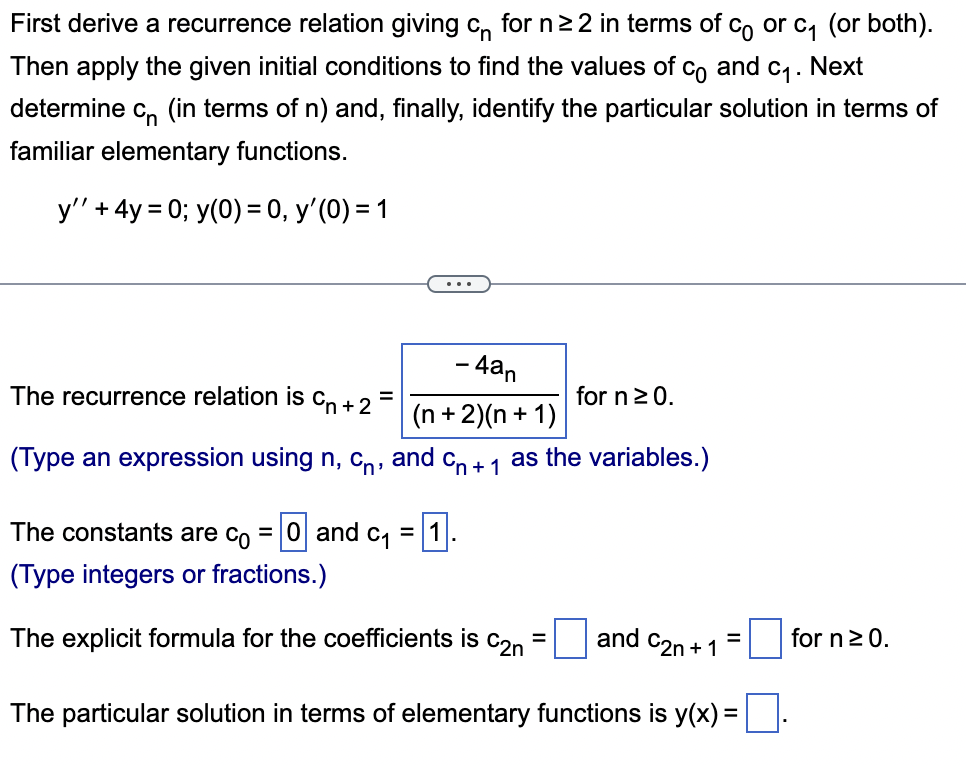First derive a recurrence relation giving c for n ≥2 in terms of c) or c₁ (or both). Then apply the given initial conditions to find the values of Co and C₁. Next determine c (in terms of n) and, finally, identify the particular solution in terms of familiar elementary functions. y'' + 4y = 0; y(0) = 0, y'(0) = 1 ... The recurrence relation is = Cn+2 - 4an (n+2)(n+1) for n ≥ 0. (Type an expression using n, C, and Cn +1 as the variables.) The constants are co = 0 and c₁ = 1 (Type integers or fractions.) The explicit formula for the coefficients is C2n = and C2n+1 = for n ≥ 0. The particular solution in terms of elementary functions is y(x) =
First derive a recurrence relation giving c for n ≥2 in terms of c) or c₁ (or both). Then apply the given initial conditions to find the values of Co and C₁. Next determine c (in terms of n) and, finally, identify the particular solution in terms of familiar elementary functions. y'' + 4y = 0; y(0) = 0, y'(0) = 1 ... The recurrence relation is = Cn+2 - 4an (n+2)(n+1) for n ≥ 0. (Type an expression using n, C, and Cn +1 as the variables.) The constants are co = 0 and c₁ = 1 (Type integers or fractions.) The explicit formula for the coefficients is C2n = and C2n+1 = for n ≥ 0. The particular solution in terms of elementary functions is y(x) =
Linear Algebra: A Modern Introduction
4th Edition
ISBN:9781285463247
Author:David Poole
Publisher:David Poole
Chapter4: Eigenvalues And Eigenvectors
Section4.6: Applications And The Perron-frobenius Theorem
Problem 56EQ
Related questions
Question

Transcribed Image Text:First derive a recurrence relation giving c for n ≥2 in terms of c) or c₁ (or both).
Then apply the given initial conditions to find the values of Co and C₁. Next
determine c (in terms of n) and, finally, identify the particular solution in terms of
familiar elementary functions.
y'' + 4y = 0; y(0) = 0, y'(0) = 1
...
The recurrence relation is
=
Cn+2
- 4an
(n+2)(n+1)
for n ≥ 0.
(Type an expression using n, C, and Cn +1 as the variables.)
The constants are co = 0 and c₁ = 1
(Type integers or fractions.)
The explicit formula for the coefficients is
C2n
=
and C2n+1
=
for n ≥ 0.
The particular solution in terms of elementary functions is y(x) =
Expert Solution
This question has been solved!
Explore an expertly crafted, step-by-step solution for a thorough understanding of key concepts.
Step by step
Solved in 1 steps

Recommended textbooks for you

Linear Algebra: A Modern Introduction
Algebra
ISBN:
9781285463247
Author:
David Poole
Publisher:
Cengage Learning

Linear Algebra: A Modern Introduction
Algebra
ISBN:
9781285463247
Author:
David Poole
Publisher:
Cengage Learning